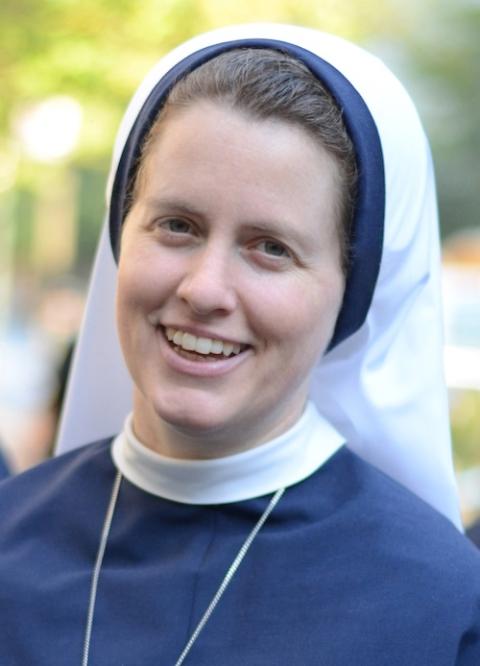
Sister Magdalene Teresa of the Sisters of Life (Courtesy of the Sisters of Life)

Sister Magdalene Teresa of the Sisters of Life (Courtesy of the Sisters of Life)
Prayer and fasting are two elements the Sisters of Life know very well. And in this time of fear, loss and uncertainty, its members have seen the need for both increase beyond measure.
Hundreds of expectant mothers here — and worldwide — need their help, along with families and individuals running low on money, food and hope.
To see how this order is helping them during the pandemic, Global Sisters Report talked to Sister Magdalene Teresa, who ministers to expectant mothers in its Visitation Mission. Located in New York City, the mission provides emotional support, moral and career guidance, and a judgment-free space to expectant mothers.
The order's motherhouse is in Suffern, New York, 30 minutes from Manhattan.
GSR: Please give our readers a little background on yourself.
Sister Magdalene Teresa: I have been a member of the sisters for 24 years and am originally from California. I attended the University of Washington and have bachelor's degrees in ceramics and sculpture. I have been assigned here for 19 years, working with pregnant women during the most difficult time of their lives.
Where is your mission located, and how does it function?
We do our mission out of St. Andrew's Church at 20 Cardinal Hayes Place in New York City, close to city hall, and we have 12 sisters assigned here. Each of us ministers to 50 women apiece, and although we service referrals worldwide, the largest number of our clients — 500 — is from the tri-state area, which includes New York City, New Jersey and Connecticut.
Where do your referrals come from, and how do you try to help them?
We receive them from priests, social work agencies, and even sidewalk counselors at any given time. We try to focus on the mothers' hopes and desires, telling them that we can make this happen.
Does an unexpected pregnancy cause young mothers to despair?
Not here. We let the girls know they can still be the person they intended to become. Having a child does not mean the end [of their life], and they are surprised at this — and at what we want them to accomplish.
What about adoption after they give birth?
Adoption is very unpopular in this age, and this is no longer the 1950s, when the social pressure of that time was such that it encouraged adoption. Today, media and the movies have placed it in a bad light, and many people in our culture may see adoption as the mother being irresponsible.
We have seen that the reality of a mother who chooses adoption today is one of a woman who appreciates the child she has being raised in a sacramental marriage.
Any decision an expectant mother makes about adoption is between them — her and God — but maternity is a state of grace that lasts forever.
Advertisement
Your mission also deals with mothers who had an abortion?
Yes. We counsel women who have had abortions, and we practice acceptance along with offering them hope and healing. We do this because the aftermath of an abortion is a constant, dreary, daily reminder of what the child could have been.
Have any of your clients given birth during the pandemic?
We have had 20 mothers deliver so far, but there are only four hospitals in the boroughs that serve as birthing centers because of COVID-19, and to be admitted elsewhere, the mother must have special needs. There are, however, separate entrances at the hospitals where we quarantine our expectant mothers, and we are in negotiations with all of them as regards this need.
Given this difficulty, we help them prepare for the delivery by getting them to a place of peace so the birth can go as smooth as possible. All of our work is part of an extremely beautiful concern for the child, the mother's job, and their future.
How has the pandemic changed the way the Sisters of Life perform their missions?
Everyone is doing what we are, and vice versa. At St. Clare's Convent in Washington, D.C., we are continuing to staff our adoration, but without the faithful; and those individuals who are in formation, the novices and postulants, are not leaving the motherhouse.
What can you say to encourage those who live in fear of the virus?
I am reminded of our late Cardinal [John] O'Connor and how he could always remain steadfast and believe in hope, even in a time of crisis. Crisis, even this one, can only be cast out through prayer and fasting, which is what we in the Sisters of Life do, anyway.
There is also, however, a lot of fear right now, and we should always keep in mind the vulnerability of human life and be aware of how much that fear controls us.
[Robert Alan Glover writes for Catholic News Service, National Catholic Reporter, the Tennessee Register in the Nashville Diocese, and Faith magazine in the Memphis Diocese. He lives in Lexington, Kentucky.]





